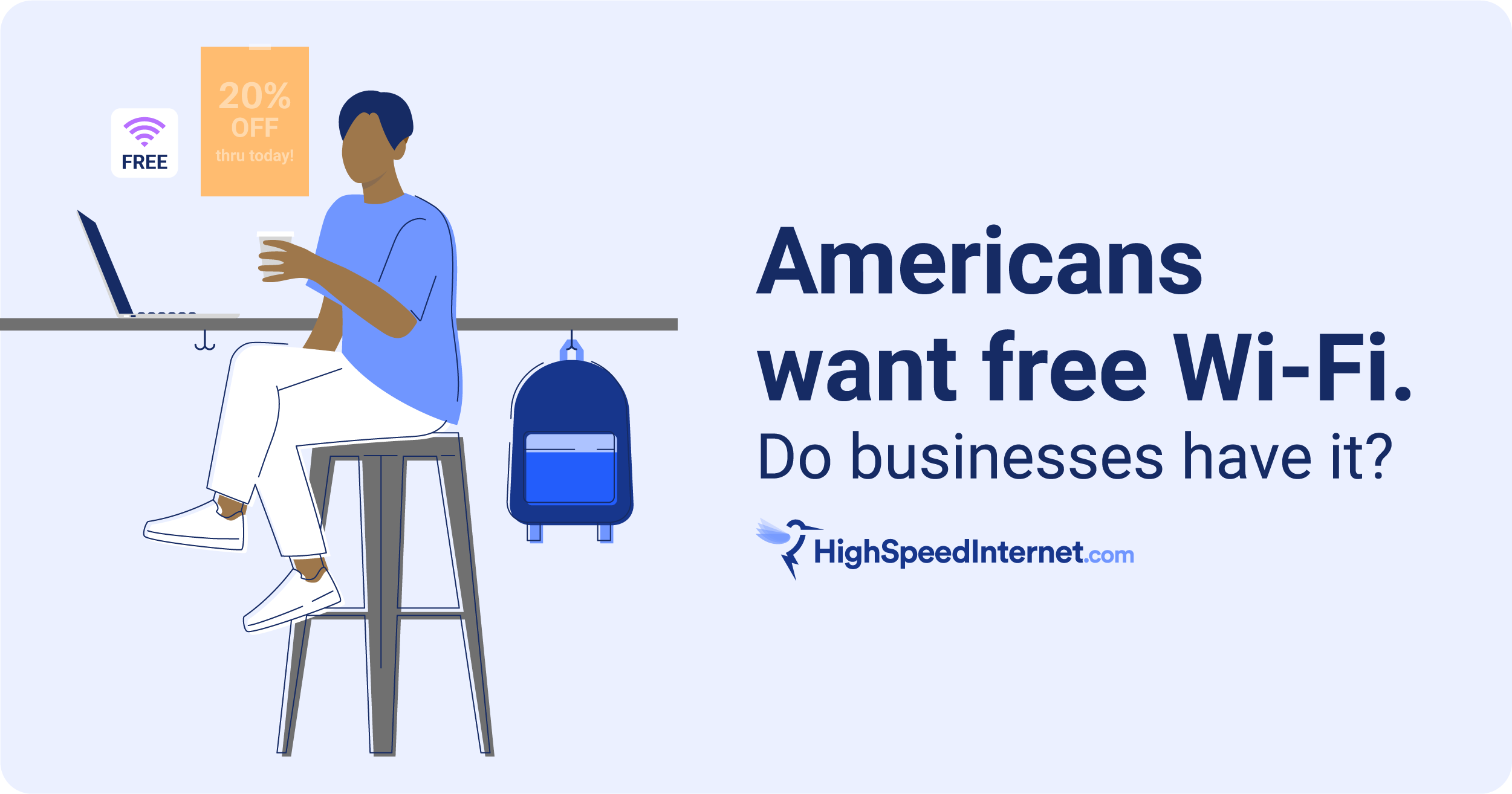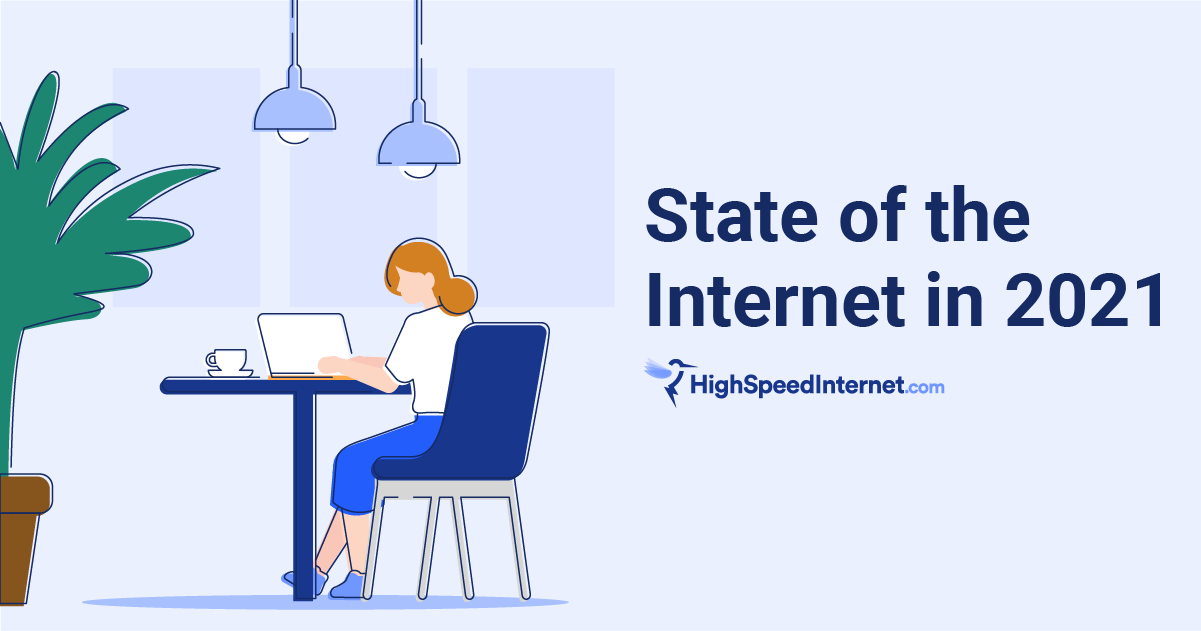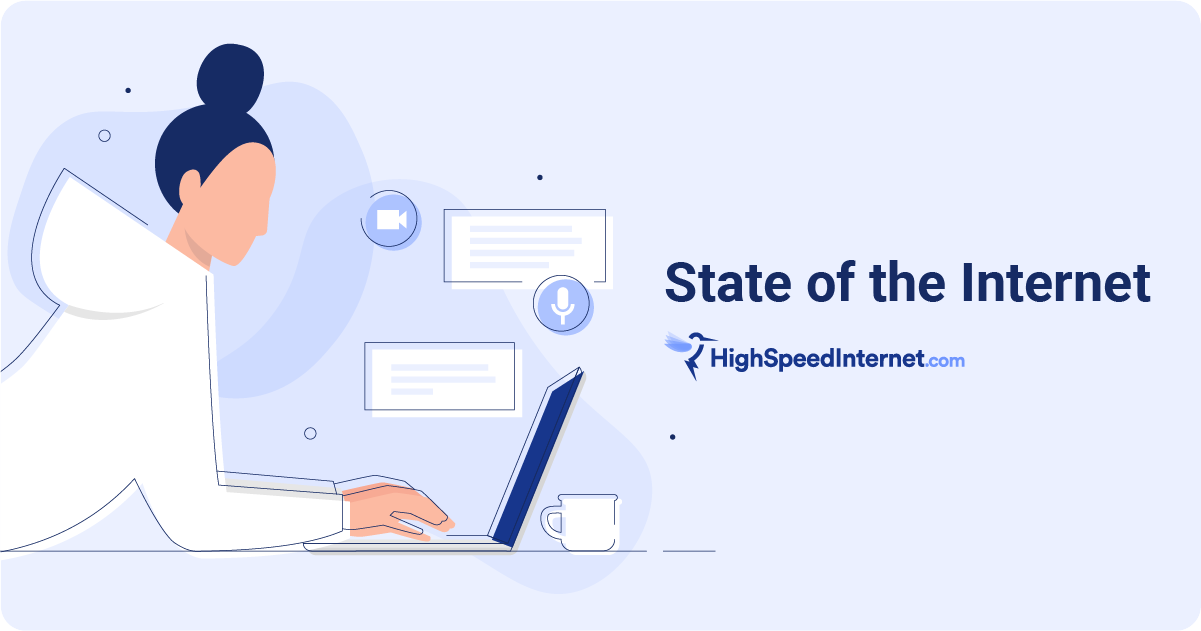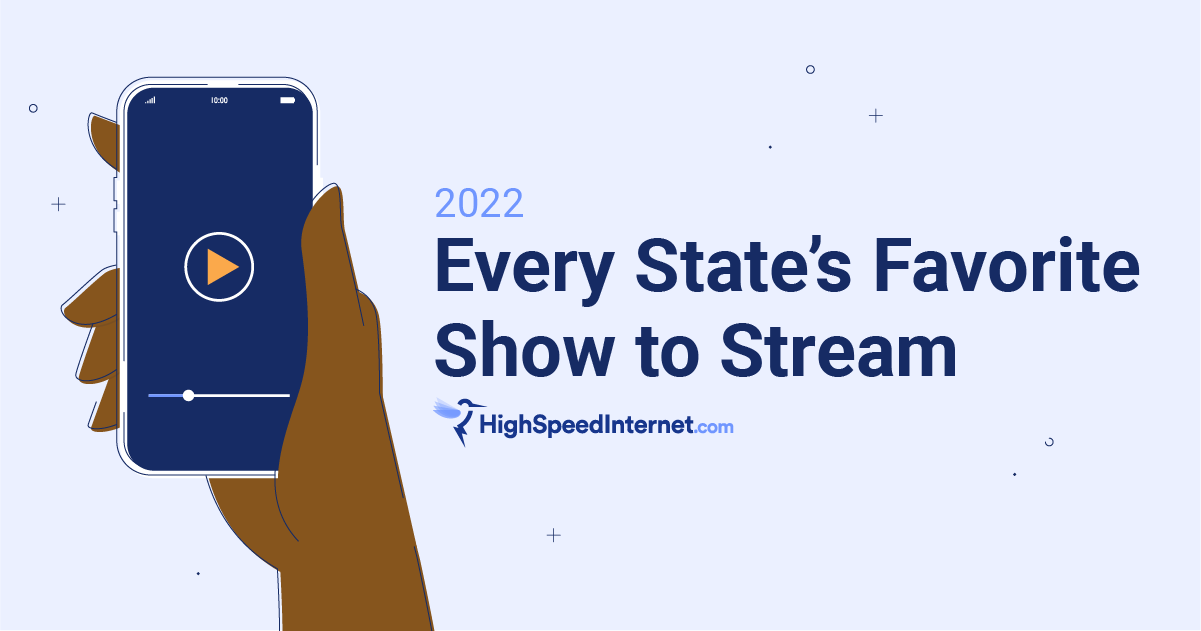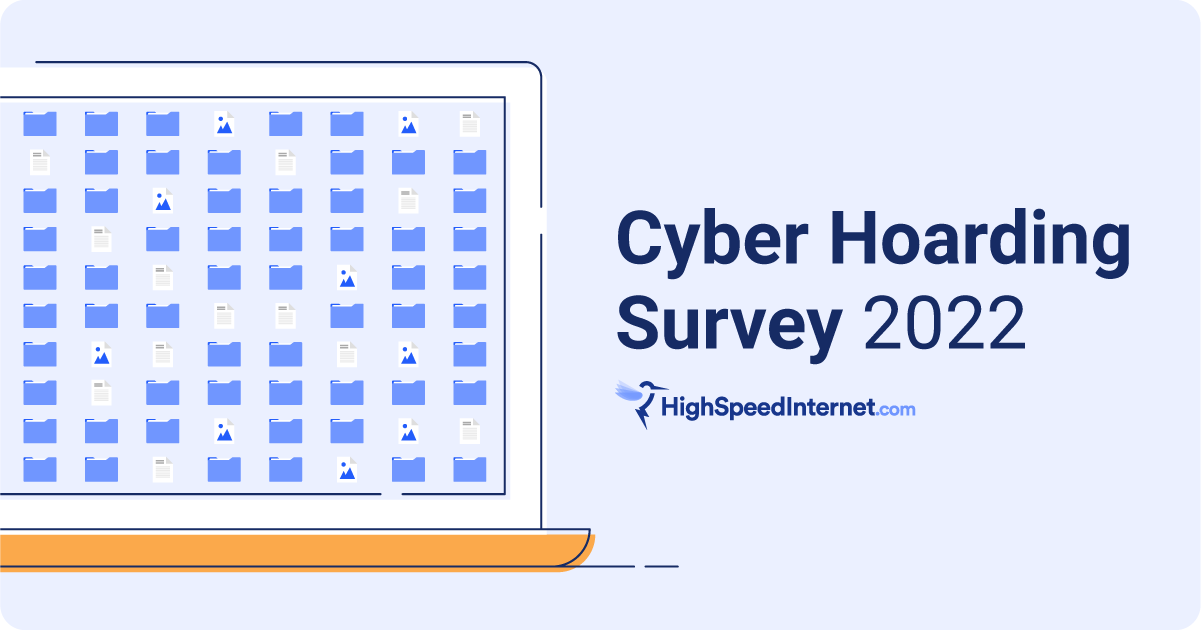The 10 Fastest and Slowest States for Internet Speeds in 2022
Jun 7, 2023 | Share
Industry Exclusive/Entertainment
Our internet speed test shows the national average internet speed in 2022 is 119.03 Mbps.
If you live in a land of weak Wi-Fi, you may want to move somewhere with more internet options to choose from. You can always look for a faster internet provider in your area, but sometimes you just can’t get the internet speed you need.
We ranked each state (and Washington, DC) by the fastest average internet speeds. How does your state measure up?
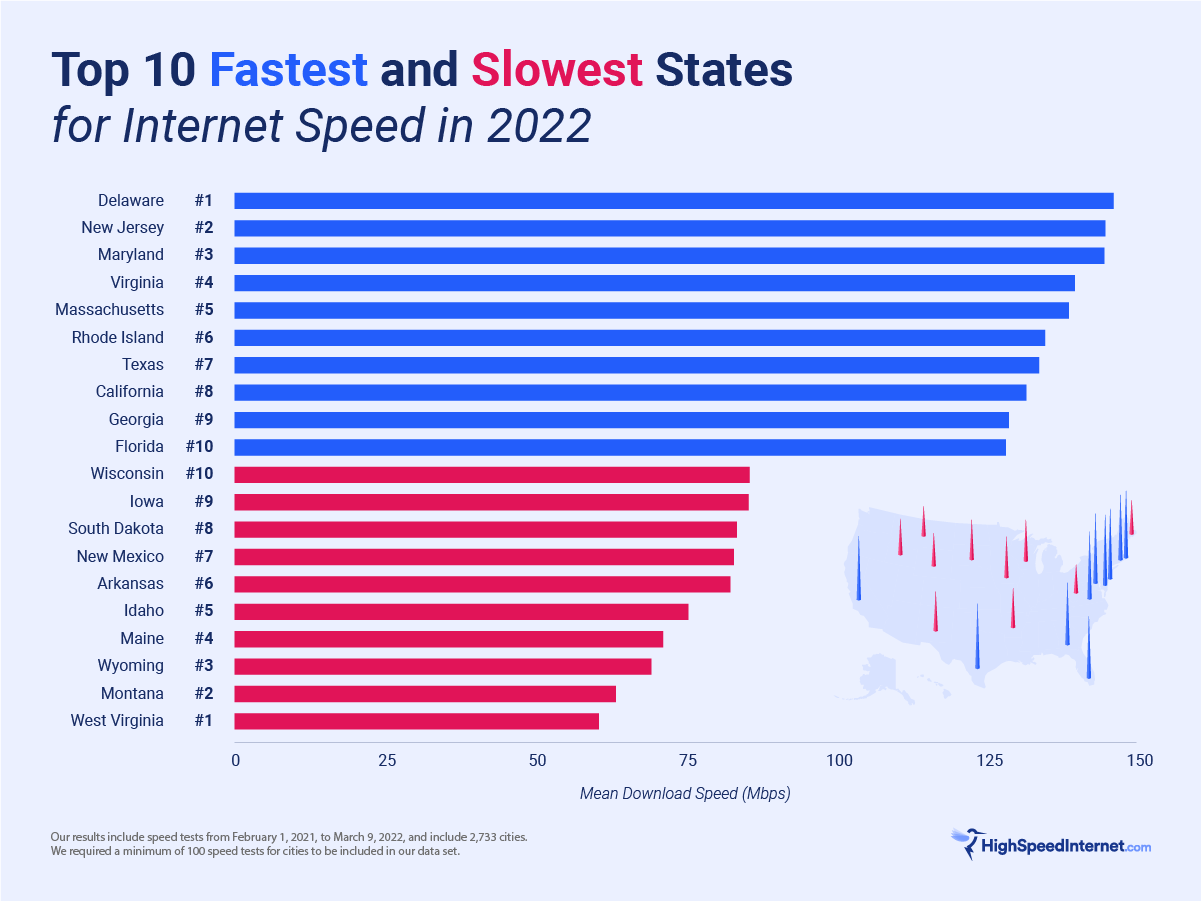
The average US internet speed in 2022
The national average speed for 2022 marks a big improvement for internet speeds nationwide. In 2021, the average internet speed was 99.3 Mbps—that means speeds have gone up 20%.
As noted in our recent fastest internet provider report, internet speeds have been going up nationwide for the last four years. This ongoing trend reflects the increased demand for fast speeds as Americans have spent more time online for work, education, healthcare, and more.
Many parts of the United States have also seen expanded access to technology like fiber internet and 5G, which further contributes to boosted speeds.
Which US state has the fastest internet?
The East Coast is home to the fastest internet speeds in the United States. Average speeds in states like Delaware and New Jersey are more than double the speeds found in the rural states at the bottom of our list.
| Fastest states | Average download speed |
|---|---|
| Delaware | 145.8 Mbps |
| New Jersey | 144.7 Mbps |
| Maryland | 144.3 Mbps |
| Virginia | 139.6 Mbps |
| Massachusetts | 138.1 Mbps |
| Rhode Island | 134.5 Mbps |
| Texas | 133.7 Mbps |
| California | 131.0 Mbps |
| Georgia | 128.0 Mbps |
| Florida | 127.79 Mbps |
Delaware, New Jersey, and Maryland all have average download speeds over 144 Mbps. And Virginia comes in close behind with average speeds of 139.6 Mbps.
-
Fastest stateFastest Advertised Speeds in Delaware
Verizon - Advertised download speeds up to 2048 Mbps
- 5G Home, DSL & Fiber
-
Fastest Advertised Speeds in New Jersey
Optimum - Advertised download speeds up to 8000 Mbps
- Cable & Fiber
-
Fastest Advertised Speeds in Maryland
Verizon - Advertised download speeds up to 2048 Mbps
- 5G Home, DSL & Fiber
Which US state has the slowest internet?
The states with the slowest speeds are mostly rural with relatively low population density—a reminder that America’s digital divide is most starkly felt in the most remote parts of the country.
Still, it’s a hopeful sign that even the slowest average speeds are more than twice as fast as the standards set by the Federal Communications Commission (FCC). The FCC defines broadband internet as a connection with minimum download speeds of 25 Mbps and minimum upload speeds of 3 Mbps—but FCC chairwoman Jessica Rosenworcel has called for that minimum to be raised.1
| Slowest states | Average download speed |
|---|---|
| West Virginia | 60.7 Mbps |
| Montana | 63.4 Mbps |
| Wyoming | 69.9 Mbps |
| Maine | 71.8 Mbps |
| Idaho | 75.1 Mbps |
| Arkansas | 82.3 Mbps |
| New Mexico | 82.7 Mbps |
| South Dakota | 83.1 Mbps |
| Iowa | 85.0 Mbps |
| Wisconsin | 85.1 Mbps |
West Virginia comes in as the slowest US state with average speeds of just 60.7 Mbps. Montana and Wyoming also have average speeds below 70 Mbps, while Maine’s average speed is 71.8 Mbps.
Every state’s average internet speed, from fastest to slowest
| State | Average download speed |
|---|---|
| Delaware | 145.8 Mbps |
| New Jersey | 144.7 Mbps |
| Maryland | 144.3 Mbps |
| Virginia | 139.6 Mbps |
| Massachusetts | 138.1 Mbps |
| Rhode Island | 134.5 Mbps |
| Texas | 133.7 Mbps |
| California | 131.0 Mbps |
| Georgia | 128.0 Mbps |
| Florida | 127.79 Mbps |
| New Hampshire | 127.7 Mbps |
| Colorado | 125.0 Mbps |
| Washington | 124.34 Mbps |
| Illinois | 122.8 Mbps |
| New York | 121.8 Mbps |
| Washington, DC | 120.9 Mbps |
| Pennsylvania | 119.0 Mbps |
| Nevada | 116.6 Mbps |
| Tennessee | 115.6 Mbps |
| Connecticut | 112.6 Mbps |
| Oregon | 111.4 Mbps |
| Utah | 111.3 Mbps |
| South Carolina | 110.8 Mbps |
| North Carolina | 110.7 Mbps |
| Indiana | 110.5 Mbps |
| Michigan | 104.6 Mbps |
| Kansas | 101.8 Mbps |
| Louisiana | 101.4 Mbps |
| Missouri | 101.3 Mbps |
| Oklahoma | 101.2 Mbps |
| Alabama | 99.7 Mbps |
| Arizona | 98.8 Mbps |
| Nebraska | 98.8 Mbps |
| Minnesota | 96.6 Mbps |
| Kentucky | 94.5 Mbps |
| Mississippi | 94.4 Mbps |
| Ohio | 92.4 Mbps |
| Hawaii | 90.2 Mbps |
| Vermont | 89.6 Mbps |
| Alaska | 88.0 Mbps |
| North Dakota | 88.0 Mbps |
| Wisconsin | 85.1 Mbps |
| Iowa | 85.0 Mbps |
| South Dakota | 83.1 Mbps |
| New Mexico | 82.7 Mbps |
| Arkansas | 82.3 Mbps |
| Idaho | 75.1 Mbps |
| Maine | 71.8 Mbps |
| Wyoming | 69.9 Mbps |
| Montana | 63.4 Mbps |
| West Virginia | 60.7 Mbps |
Methodology
Our data comes from speed tests taken across 2,733 US cities from February 1, 2021, to March 9, 2022. We required a minimum of 100 speed tests for cities to be included in our data set.
We filtered out incomplete, duplicate, and cellular phone data to see what most people were working with on their laptops, desktops, and home-connected devices. After filtering, we used a total of 1,421,960 internet speed test results to rank states from fastest to slowest for average internet speeds.
We use the arithmetic mean download speed for our state averages, so some of the speeds may seem faster or slower due to outliers in the data.
Sources
1. Molly Wood and Kimberly Adams, Marketplace, “There’s a New Boss at the FCC. Let’s Talk About the Internet, Shall We?” July 5, 2021. Accessed April 4, 2022.
Author - Peter Holslin
Peter Holslin has more than a decade of experience working as a writer and freelance journalist. He graduated with a BA in liberal arts and journalism from New York City’s The New School University in 2008 and went on to contribute to publications like Rolling Stone, VICE, BuzzFeed, and countless others. At HighSpeedInternet.com, he focuses on covering 5G, nerding out about frequency bands and virtual RAN, and producing reviews on emerging services like 5G home internet. He also writes about internet providers and packages, hotspots, VPNs, and Wi-Fi troubleshooting.
Editor - Rebecca Lee Armstrong
Rebecca Lee Armstrong has more than six years of experience writing about tech and the internet, with a specialty in hands-on testing. She started writing tech product and service reviews while finishing her BFA in creative writing at the University of Evansville and has found her niche writing about home networking, routers, and internet access at HighSpeedInternet.com. Her work has also been featured on Top Ten Reviews, MacSources, Windows Central, Android Central, Best Company, TechnoFAQ, and iMore.


